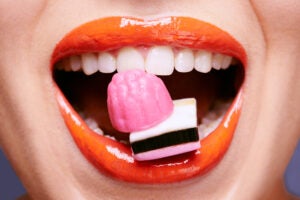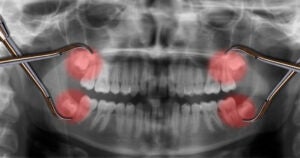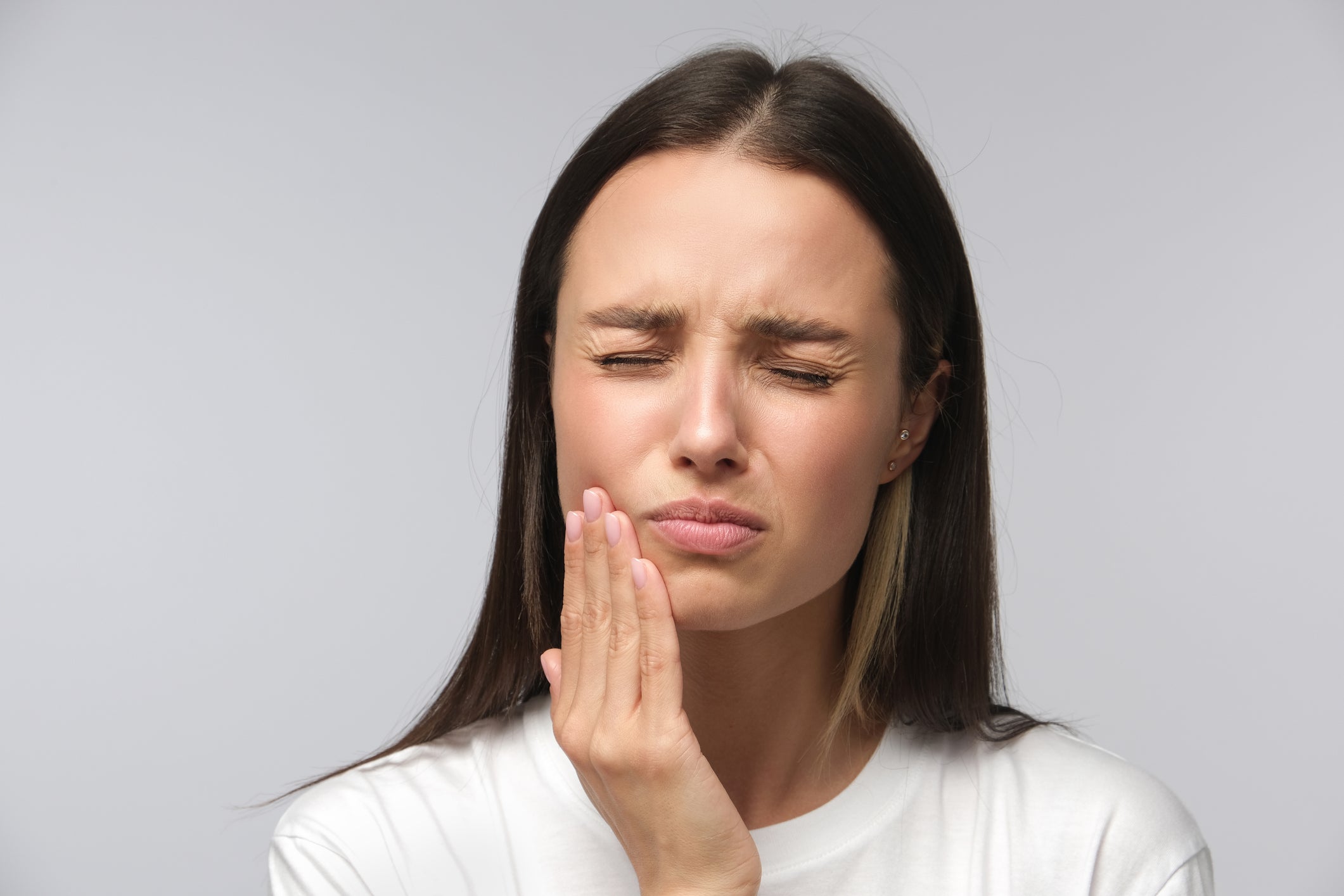-
Is Coffee Ruining Your Teeth?

Fresh cup of coffee.
If you’re like most Americans, the day doesn’t quite start until you’ve had your morning coffee. Coffee is a delicious beverage that boosts your energy and may even be good for your heart health, but it can be hard on your smile, leaving your chompers less than pearly white. Beyond the stains it leaves behind, is coffee actually harmful? Could your morning cup of joe be ruining your teeth?
The answer is not as straightforward as you might think. If you’re a coffee drinker, you already know that it is a substance that stains. It will stain your favorite shirt, the upholstery in your car, your best tablecloth, and, yes, your teeth. It stains because it contains plant-based compounds called tannins that leave behind discoloration. The acidity in coffee helps with this staining because acid softens tooth enamel, making it easier for stains to penetrate the teeth. Because the stains seep through the enamel, though, coffee stains are difficult to remove with tooth brushing.
What’s more, as you get older, your tooth enamel begins to change, becoming more vulnerable and susceptible to staining. So, if you have a five cup a day coffee habit, you’re likely to have some noticeable stains after you’ve sustained it for several years. But beyond the yellowing teeth, does coffee do any damage?
There is, of course, the matter of coffee breath. Along with the acids, coffee introduces bacteria into your mouth, and it sticks to your tongue, causing halitosis. Fortunately, this is easily remedied by brushing your teeth after you drink coffee. Then, too, coffee is not alone in bringing bacteria into the environment of your mouth: any drink that isn’t water will do that. Fortunately, your saliva helps counteract the bacteria and allow your enamel to repair itself, but it’s important to brush and floss regularly to prevent cavities. Be aware that the sugar (or syrup) that goes into your coffee is much more damaging to your teeth than the coffee itself.
How can you continue to enjoy your coffee without staining your smile? You can’t, completely, but there are some things you can do to minimize the issue.
- Limit your coffee. Don’t drink coffee all day long, instead sticking to one or two cups of coffee at one time of day.
- Brush your teeth. Brushing with fluoride toothpaste after every cup is best because brushing removes bacteria and fluoride strengthens enamel. Bonus: you’ll lose the coffee breath. It is important to note, however, that you should wait about 30 minutes after your coffee to brush and floss, because immediately after you drink it your enamel will be soft enough to sustain damage from your toothbrush.
- Drink your coffee through a straw. When you use a straw, you can keep most of the coffee away from your teeth, which limits staining.
- Wash your coffee down with water. Water is always a good choice, whether you’re drinking coffee, eating food, or drinking alcoholic beverages. Why? Because water helps to keep the saliva flowing and rinses debris and bacteria away from your mouth.
- See your dentist regularly. Semi-annual cleanings can make a world of difference in the look of your teeth. Beyond just cleaning the teeth, they polish the enamel so that it can do a better job protecting your teeth from stains. Your dentist can also offer teeth whitening treatments to remove discoloration that has already appeared on your teeth.
If you are looking for a dentist to do those semi-annual cleanings and handle all your other dental needs, choose the dentist voted best in New York. At Park 56 Dental Group, we offer pediatric, prosthodontics, endodontics, oral surgery, Invisalign®, emergency, and sedation dentistry, all at the highest level of treatment. We serve the Midtown, Central Park, Upper East Side, Park Avenue, and all surrounding Manhattan and New York areas, with a patient-centered practice that has hours to fit your schedule. Schedule your complimentary consultation today by contacting us online or calling us at (212) 826-2322.
-
How Fixing Your Teeth Can Make You Look More Youthful

When we think of looking more youthful, we often think of anti-aging products, makeup or wardrobe changes, and diet and exercise. However, one key aspect of looking youthful is often overlooked–our teeth. Our teeth can greatly impact our appearance and how we are perceived by others. Whether it’s fixing crooked or chipped teeth, whitening discolored teeth, or replacing missing teeth, getting the perfect smile can make you look years younger. In this blog, we’ll explore how fixing your teeth can make you look more youthful and confident.
Straight Teeth
One of the most common ways fixing your teeth can make you look more youthful is by straightening them. Straight teeth not only look more aesthetically pleasing, but they also give the impression of youthfulness. Crooked teeth can make you look older, whereas straight teeth can make you appear more vibrant and lively. Additionally, straight teeth are often associated with good dental hygiene, which reflects positively on your overall health. Invisalign is a popular method for straightening teeth without the visual distractions of brackets and wires.
Whiter Teeth
Another way to achieve a youthful smile is to whiten your teeth. As we age, our teeth naturally become less white due to wear and tear, diet, and lifestyle factors. Whitening your teeth can instantly lift years off your appearance and give you a more youthful glow. A brighter smile can also improve your self-confidence, leading to a more youthful and outgoing personality.
Fixing Chipped Teeth
Chipped, cracked or broken teeth can also make us look older than we actually are. When we have missing or damaged teeth, we may avoid smiling or try to hide our teeth, which can make us seem less approachable and friendly. Fixing chipped teeth can restore our confidence and make us look more youthful and polished.
Replacing Missing Teeth
Missing teeth affects our speech and eating habits and can also make us look older. When teeth are missing or not properly aligned, it can make our face appear sunken or sagging. Replacing missing teeth can give us fuller, younger-looking faces and boost our confidence when smiling and speaking.
Health Benefits
In addition to the aesthetic benefits of fixing your teeth, there are also numerous health benefits. Straightening teeth can improve your bite and chewing ability, making it easier to digest food properly. Whitening teeth can remove harmful bacteria and improve overall oral health. Fixing chipped or broken teeth can prevent further dental problems such as cavities or infection, leading to improved overall health.
Park 56 Dental’s Cosmetic Treatments Can Make You Look More Youthful Today!
Fixing your teeth can be a simple and effective way to look more youthful and confident. Whether it’s through straightening, whitening, fixing chips or breaks or replacing missing teeth, achieving a perfect smile can do wonders for your appearance and overall health. At Park 56 Dental in New York, we offer a variety of dental services to give you the perfect smile you deserve. Schedule an appointment today and start your journey towards a more youthful and confident you!
-
8 Bad Habits That Ruin Your Dental Health

Are you looking for ways to take better care of your smile? It’s easy to focus on things you should do, like brush morning and night, floss once a day, and visit your dentist for a professional cleaning every six months. But what about the things you shouldn’t do? Here are eight bad dental health habits that you need to break right now.
- Chewing on ice or hard candy: Munching on the ice cubes at the bottom of your drink may seem harmless, but this habit can damage your teeth if you bite down wrong. Chill your beverage before serving it to avoid needing ice, or drink from a straw to reduce the temptation to chew.
- Biting your nails or chewing on pens: These bad habits introduce harmful germs into your mouth, damage your teeth, and lead to jaw dysfunction. If you want to stop biting your nails, try wearing bitter-tasting nail polish.
- Using your teeth as tools: Never use your teeth to open packages, undo knots, tear tape, or open bottles. Instead, find the right tool for the job, such as scissors or a bottle opener.
- Constantly snacking or sipping on sugary drinks: Eating nonstop keeps your teeth in constant contact with food particles, increasing the risk of cavities. This habit is even more problematic if your snacks or drinks have high sugar content. The solution is to eat balanced meals so you aren’t tempted to snack all day. Then, reach for water instead of juice, soda, or sports drinks.
- Brushing too hard: Aggressive brushing can wear down tooth enamel and irritate your gums. To avoid these problems, choose a soft-bristled toothbrush and focus on gently massaging your teeth, not scrubbing them raw.
- Playing contact sports without a mouthguard: It only takes one hit to the mouth to chip, break, or even lose a tooth. You might also bite your cheek or tongue. To protect your teeth and soft tissues, ask your dentist about creating a custom mouthguard.
- Grinding your teeth: Stress can cause nighttime tooth grinding, or bruxism, a habit you have little control over. If you think you grind your teeth in your sleep, the best solution is to wear a special nighttime mouthguard your dentist makes just for you.
- Smoking or chewing tobacco: Using tobacco products of any kind stains your teeth, causes gum disease, and increases the risk of oral cancer. Save your dental health—talk to your dentist for tips to quit smoking
At Park 56 Dental, we know it can be hard to break bad oral health habits. But just a few small changes can go a long way toward preserving your smile! For more tips or to schedule your next dentist visit, feel free to get in touch. We’ve been voted the best dentist in New York, with over 20 years of experience serving the 10022 zip code area. Call us at (212) 826-2322 or contact us online to speak with our NYC dentist today.
-
Why Do Dentists Encourage You to Have Your Wisdom Teeth Removed?

The human mouth goes through numerous changes over the years. For many people, one of the most memorable milestones is the appearance of the third molars around ages 17 to 21. “Wisdom teeth” are so named because they are the final teeth to appear and come in at a mature age.
When wisdom teeth erupt through the gums correctly, they can help with chewing. However, while there’s no definitive rule, most people have their wisdom teeth removed. Why is this? And how do you know if you should keep your wisdom teeth or not?
Many situations warrant having your wisdom teeth removed. Here are the most common reasons your dentist may encourage you to make this choice.
Fully Impacted Wisdom Teeth
An impacted tooth fails to erupt through the gums, meaning it remains covered by gum tissue. This may occur if your mouth is too small for the tooth to emerge. Dentists usually recommend removing impacted wisdom teeth because trapped bacteria could cause painful cysts or abscesses to form.
Partially Impacted Wisdom Teeth
A partially impacted tooth erupts partway through the gums. Dentists almost always advise removing wisdom teeth in situations like this. After all, the partial eruption makes it easy for bacteria to get inside, leading to swelling, pain, and stiffness in the jaw. Tooth decay is also more likely because it’s difficult to clean a partially impacted tooth.
Overcrowding
Some willful wisdom teeth erupt fully, even if there isn’t room in the jaw. This can overcrowd your mouth and damage neighboring teeth. Your entire smile may even shift, throwing off your bite and causing jaw pain.
Necessary for Your Dental Care Plan
Your dentist may recommend wisdom teeth extraction as part of your overall oral care plan. For instance, if you’re planning to get braces soon, it’s wise (pun intended) to remove problematic wisdom teeth before you begin straightening your smile. And if your wisdom teeth come in after having braces, prompt removal prevents them from undoing all your hard work.
Other Problems
If you decide to keep your wisdom teeth for now, continue to monitor them for signs of trouble. It may become necessary to remove them if issues develop near your wisdom teeth, such as:
- Tooth, jaw, or cheek pain
- Repeated infections
- Gum disease
- Extensive tooth decay
The decision to remove your wisdom teeth isn’t always straightforward. That’s why it’s important to visit the dentist regularly. Routine oral exams and X-rays reveal what’s happening in your mouth so you can take the best course of action for your oral health.
If your wisdom teeth are giving you trouble, visit Park 56 Dental for a consultation. We offer compassionate, high-quality dentistry in the 10022 zip code area of NYC, and we’re confident we can help you make the right choice regarding your wisdom teeth. If you decide to have them extracted, rest assured that we offer sedation dentistry to make you feel more comfortable. Call us at (212) 826-2322 to set an appointment today.
-
10 Ways Stress Can Impact Your Teeth

You know that stress can manifest as a headache, muscle tension, or high blood pressure, but have you ever considered how stress can impact your teeth? Here are 10 of the most commonly reported dental health issues linked to stress.
- Tooth grinding: Also known as bruxism, nighttime tooth grinding is a common condition, especially among stressed individuals. The unconscious habit wears down your teeth over time and may also cause tooth shifting and jaw pain.
- Tooth fractures: Teeth have tiny fissures in them due to everyday wear and tear. As long as they don’t become any worse, these fissures are no problem. Unfortunately, jaw clenching and stress go hand-in-hand, causing weak teeth to eventually fracture and break.
- Sensitivity: Nighttime grinding and daytime clenching can wear down the protective enamel layer, leaving your teeth more sensitive to hot and cold temperatures and sweet and sour foods.
- Temporomandibular joint (TMJ) pain: The TMJ is the joint connecting each side of your jaw to your skull. Pain or dysfunction in this joint is known as temporomandibular joint disorder, or TMD. Stress-related tooth grinding, jaw clenching, and muscle tension may cause or aggravate TMD.
- Gum disease: Some studies suggest a link between the stress hormone cortisol and bacterial growth that leads to gum disease, also called periodontal disease. This chronic oral health problem can cause gum sensitivity, bad breath, and eventually tooth loss.
- Cold sores: Also called fever blisters, cold sores are caused by the herpes simplex virus. Being upset or stressed can trigger an outbreak at the corners of your mouth, which may take a week or more to clear up.
- Canker sores: These painful mouth sores make it difficult to eat spicy, salty, or acidic foods. Experts aren’t sure what causes canker sores, also called recurrent aphthous stomatitis (RAS), but it appears that stress increases your risk.
- Oral infections: Stress negatively impacts your immune system, making you more vulnerable to low-grade infections in your mouth and elsewhere in your body.
- Dry mouth: Formally known as xerostomia, dry mouth is when your salivary glands fail to produce enough saliva. Among other causes, stress and anxiety have been shown to decrease saliva production, causing dry mouth.
- Bad oral health habits: Stressed-out people are often exhausted or pressed for time, making them more likely to neglect their oral health, as well as rely on cigarettes, alcohol, and unhealthy comfort food. All of these habits increase the risk of cavities, gum disease, and other concerns.
Don’t allow stress to wreak havoc on your dental health! Instead, take steps in your daily life to reduce anxiety, such as meditating, doing yoga, and working on your time management skills. Then, fit dentist visits into your busy schedule to keep on top of oral health problems as they arise. To work with the best dentist in New York, contact Park 56 Dental at (212) 826-2322. We have served patients in the 10022 zip code area for over 20 years.
-
The Best and Worst Thanksgiving Foods for Your Teeth

When you go to plan your Thanksgiving dinner menu, how do you decide what to serve? Most people opt for traditional family favorites, perhaps with a new dish or two to try. But if you or someone in your family is struggling with oral health issues, it may be wise to choose foods based on how good they are for your teeth and gums. Here are some of the best and worst foods to eat for Thanksgiving if you’re focused on good oral health.
Limit These Worst Thanksgiving Foods for Your Teeth
- Stuffing and rolls: They may be Thanksgiving staples, but the sugary carbohydrates in stuffing and rolls feed the bacteria in your mouth. The acids left behind can then erode your teeth and lead to cavities.
- Cranberry sauce: Loaded with sugar and tooth-staining berries, cranberry sauce is known to discolor enamel and encourage cavities to form.
- Pies and desserts: Most people enjoy a slice of pumpkin or pecan pie and other desserts after Thanksgiving dinner. Keep in mind that sugar turns into acid in your mouth, making it your teeth’s worst enemy.
- Caramel corn: Popcorn is bad enough, but cover it with sticky caramel, and you have a recipe for dislodged crowns and lost fillings.
- Alcohol: The acid in wine is enough to etch your teeth if you drink it too often, so be wise about your alcohol consumption this Thanksgiving.
If you must indulge in these Thanksgiving foods, do so sparingly. Then, to remove particles from your mouth, rinse with water throughout the meal and brush your teeth 30 minutes after your last bite.
Eat More of These Best Thanksgiving Foods for Your Teeth
- Turkey: Good news—the quintessential Thanksgiving food is perfectly fine for your teeth! Turkey doesn’t contain starch or sugar that can harm your oral health, and it’s also an excellent source of vitamin D and protein to support a healthy smile.
- Vegetables: Carrots, celery, cucumbers, and tomatoes are a healthy addition to your Thanksgiving feast. Veggies are chockfull of vitamins and nutrients that promote good oral health. The act of chewing them also scrubs your teeth, massages your gums, and stimulates saliva flow.
- Sweet potatoes: Feel free to load your plate with sweet potatoes because they’re high in potassium, dietary fiber, and vitamin B6. Just be careful about the brown sugar or marshmallows often served with them.
- Cheese and nuts: Munch on these snacks guilt-free, knowing they’re filled with calcium, protein, and other nutrients your teeth need to stay healthy and strong.
If you notice stained, yellowed, or aching teeth around the holidays, don’t put off visiting the dentist. A trip to Park 56 Dental will leave your teeth feeling cleaner and brighter. Voted NYC’s best dentist, we are well-equipped to meet all your preventative and restorative dentistry needs. Give us a call at (212) 826-2322 to set up an appointment today! We have been serving patients in the 10022 zip code area since 1997.
-
How to Prevent Cracking Your Teeth

Your bite produces massive amounts of pressure, as much as 5,600 pounds per square inch. Teeth structure is amazingly resistant to this pressure and able to withstand a compressive force of approximately 30,000 pounds. But when you introduce foods and non-foods that are excessively hard, teeth can crack under the pressure. Tiny cracks in your teeth can put you at risk for deeper, more serious cracks and the introduction of dangerous bacteria into the tooth openings. Learn how to prevent cracks in your teeth so you can safeguard your smile for years to come!
Abstain from Foods that Could Injure Your Teeth
While teeth can withstand some tremendous forces, avoid adding extra stress by using them in proper ways. One of the most common ways teeth are damaged are from the foods and non-foods you eat or chew on. Common culprits for teeth cracks include:
- Ice
- Popcorn
- Frozen foods
- Hard candies
- Pens or pencils
If any of these foods or non-foods are a part of your daily routine, consider making some changes to protect your oral health.
Get Treatment for Teeth Grinding or Clenching
Twenty percent of Americans grind their teeth, a condition called bruxism, which is often accompanied by teeth clenching as well. Most people aren’t conscious of this stress-induced condition since it often occurs while they are sleeping. If teeth grinding isn’t treated it can lead to chips, breaks, and cracks in teeth overtime. A custom nightguard by your dentist can help treat the effects of teeth grinding.
Wear a Sports Mouthguard During Athletic Activities
Athletes are also at risk for teeth cracks from impact injuries during activities. The American Academy of Pediatric Dentistry reports that only 22 percent of children wear mouthguards while playing sports. A sports mouthguard can protect teeth from this dangerous source of oral trauma.
Park 56 Dental offers restorative dentistry to repair and prevent cracks in your teeth so cracks don’t jeopardize the health of a tooth or adjacent teeth. Contact us today at (646) 679-3989 if you have any questions about the stability of your teeth. Your health and well-being are our top priority
-
Why You Should Consider Sedation Dentistry

Sedation Dentistry is an Essential Part of Dedicated Dental Care
A positive patient experience is an important part of excellent dental care. Fear of the dentist prevents too many from taking care of their teeth in a timely manner. Dentists are dedicated to helping their patients feel welcome, comfortable, and enthusiastic about improved oral health and aesthetics through sedation dentistry techniques. Sedation dentistry can eliminate fear before or during treatment!
By the Numbers
An estimated 30% of adults avoid the dentist due to fear. That’s a lot! For many people, they could be suffering needlessly from oral diseases despite modern technological advances that offer them relief and comfort with their dental health care needs. But researchers estimate 75 million US citizens don’t seek dental care that can easily be treated by conscious sedation dentistry or general anesthesia.
What is Sedation Dentistry?
Many people refer to sedation dentistry as “sleep dentistry” but the nickname is inaccurate since the patient does not actually sleep during treatment. Sedation dentistry is a form of dental treatment that significantly reduces pain and makes procedures easier to tolerate.
This process usually involves giving patients time-release injections or intravenous anesthesia, so they can relax during their procedure without being bothered by the sight or sound in any way.
Eight Benefits of Sedation Dentistry
Sedation dentistry is a great option for patients who are afraid or anxious about visiting the dentist. It allows them to receive routine oral care without feeling threatened. It allows their minds to relax during procedures while under close supervision from providers trained in sedation techniques.
Studies have shown that this form of treatment often results in less treatment time compared to those not under sedation. Other benefits of sedation dentistry include:
- Makes the appointment time go by faster.
- Reduces your dental anxiety during and before treatment.
- Encourages you to make your preventive appointments.
- Reduces the strength of your gag reflex.
- Minimizes pain during treatment.
- Helps you sit still for longer procedures.
- Improves your overall health as you better your oral health.
- Offers different strengths of sedation dentistry for ultimate comfort.
Park 56 Dental is IV-certified and licensed by the American Dental Association to deliver sedation dentistry. Our specialty training by the State Board of Dental Examiners allows us to administer controlled medications to foster a comfortable, pain-free experience.
Contact us today at (646) 679-3989 to learn the type of sedation dentistry that is best for you.
-
How to Care for Yourself After a Dental Procedure

Root canals, tooth extractions, and dental implants are common smile restorations that require some recovery time. Choosing an experienced oral surgeon is the first step toward ensuring a comfortable recovery.
At Park 56 Dental, we offer sedation dentistry to make your time in the dentist’s chair as comfortable as possible. We also review the recommended aftercare with you before you undergo any procedure, so you know exactly what to expect during your recovery. And if you have any urgent questions for us, rest assured that we answer emergency calls 24 hours a day.
Here are some general aftercare tips we recommend to take care of yourself after a dental procedure.
- Take it easy: Take time off school or work and rest at home. Avoid physical exertion for two to three days, and keep your head propped up with pillows to reduce inflammation.
- Apply ice packs: Ice helps to numb any localized pain and brings the swelling down. Throughout the first recovery day, apply a towel-wrapped ice pack for 15 minutes on, 15 minutes off.
- Leave gauze pads in place: Wait for three or four hours to remove any gauze pads your oral surgeon put in your mouth. This helps minimize bleeding and helps the surgical area clot properly.
- Eat soft food: Stick to a liquid or soft-food diet for a few days. Chilled soup, mashed potatoes, scrambled eggs, yogurt, smoothies, milkshakes, and ice cream are all good options.
- Avoid hot foods and drinks: Wait until the local anesthesia wears off completely to eat or drink anything hot so you don’t accidentally burn your tongue or the roof of your mouth.
- Don’t drink through a straw: Suction in the mouth can dislodge the blood clot from the treated area, leading to a painful condition called dry socket. To prevent this, don’t drink from a straw for three days after oral surgery.
- Take medication: Over-the-counter pain relievers can help make your recovery more comfortable. If your oral surgeon prescribes antibiotics, take those as directed as well.
- Rinse with salt water: 24 hours after your procedure, rinse gently with warm saltwater. A good ratio is one-half teaspoon salt per one-half cup of water. Rinse after every meal and snack to help remove food particles from around the surgical area.
- Brush carefully: Avoid brushing the treated area until it has fully healed, but continue to brush the rest of your teeth.
- Don’t smoke or drink alcohol: These habits can interfere with the healing process, so avoid them for at least 24 hours. Better yet, quit smoking and always limit your alcohol intake to improve your overall health.
If you’re looking for skilled dental care and oral surgery in NYC, you’ve come to the right place. Park 56 Dental has been voted NYC’s best dentist, so why would you go anywhere else for your next dental procedure? To learn more about our services, please call us at (212) 826-2322 or contact us online today.
-
How to Prevent Gum Recession

Receding gums are a common oral health problem. You know your gums are receding if you have less gum tissue than you used to and your teeth look longer than normal. What you’re seeing is the exposed tooth root, which may be sensitive to hot and cold temperatures. Gum tissue doesn’t grow back, so it’s important to prevent gum recession before it’s too late.
- Brush your teeth gently: It’s a misconception that the more aggressively you brush, the cleaner your teeth become. Not only does vigorous brushing wear down tooth enamel, but it also irritates your gums. Switch to a soft-bristled toothbrush, and be careful about how much pressure you use when brushing each morning and night.
- Floss daily: Flossing targets the hard-to-reach places between your teeth and along the gum line. Scraping away plaque and stubborn food particles from these areas is critical to keep your gums healthy and prevent them from receding.
- Stop smoking: Tobacco use of any kind is horrible for your oral health. It leaves a sticky film in your mouth that can cause gum recession if not removed thoroughly. Stop smoking to promote gum health, prevent tooth stains, and reduce the risk of oral cancer.
- Eat a nutritious diet: Gum tissue, like the rest of your body, needs adequate vitamins and minerals for optimum health. Some of the best foods for a healthy smile include apples, carrots, leafy greens, plain yogurt, and almonds.
- Wear a mouthguard: Do you grind your teeth at night? If you’re not sure, your dentist can diagnose this condition, known as bruxism. Then, you can look into getting a custom mouthguard to protect your teeth and gums while you sleep.
- Straighten your smile: Crooked teeth and a misaligned bite place excess pressure on your jawbone and gums, making gum recession more likely. Invisalign is the invisible way to straighten your teeth and keep your gums healthy.
- Avoid mouth piercings: Lip and tongue rings are a surefire way to irritate your gums and cause them to recede. So play it safe and stick to ear piercings to keep your mouth free of foreign objects.
- Visit the dentist: The American Dental Association recommends that most people visit the dentist every six months for a checkup and cleaning. During your exam, a hygienist will remove tartar and plaque from your teeth that can irritate the gums. Your dentist will also check for signs of recession and offer personalized tips to prevent the problem from getting any worse.
If you notice receding gums or other signs of gum disease, reach out to Park 56 Dental. We’ve been voted the best dentist in NYC, so you can rest assured that our team will take great care of you. We offer effective treatments to help slow or even reverse gum disease and recession, including root planing and scaling, flap surgery, and bone and tissue grafts. To learn more, please call us at (212) 826-2322 or contact us online today.
RECENT POSTS
categories
- Uncategorized
- Cosmetic Dentistry
- Veneers
- Healthier Teeth
- Teeth Whitening
- Dental Health
- Video
- Dental Emergencies
- Invisalign
- Dental Implants
- Root Canal
- Sedation Dentistry
- Infographic
- Dental Crowns and Bridges
- Dental Anxiety
- Gum Disease
- COVID-19
- Bad Breath
- New York Dentist
- Cut out sugar
- General Dentistry
- Oral Health
- Oral Cancer
- Dry Mouth
- Gum Health
- Toothache
- Dental Sealants
- Cavities



